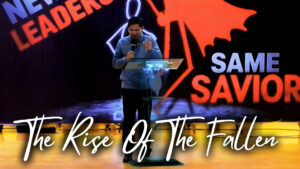TITLE: ZEAL FOR THE HOUSE OF GOD
Psalm 69: 9
For zeal for your house has consumed me, and the reproaches of those who reproach you have fallen on me.
John 2:17
His disciples remembered that it is written: “Zeal for Your house will consume Me.”
Introduction: “Zeal”
The House of God had such a prominent place in the heart of King David amidst the busyness of his demanding life. This beloved shepherd-king of Israel was a general of an active army, the ruler of a vastly expanding kingdom, a husband of several wives and a father of many children. He was a brilliant architect, a skillful musician, songwriter and poet, as well as a prophet.
David’s life was not free from disappointment and pain: his childhood was marked by paternal negligence and sibling rivalry; his youth was celebrated by heroism which caused him to be hunted down and exiled by a jealous monarch.
But David was not without fault either: the Scriptures clearly record moments of rage and pride, an adulterous affair and murder, as well as David’s passive fatherhood.
David had a zealous passion for the House of God more than anything this world could offer.(Psalm 69:9). “For zeal for your house has consumed me,..”
MAIN POINTS
- Being Zealous
- Zealous for God’s House
- The Warning on Passivity
- Christ’s Consuming Zeal
- BEING ZEALOUS
To be zealous means to have an “ardor or fervor of spirit.” There is an energy and an enthusiasm about one’s faith and belief. The believer is eager to “embrace, pursue, or defend” everything he believes in. He is “Passionate. All in. On fire. Sold out.”
E.g. Michaelangelo.
In the Christian faith, zeal is not just encouraged, it is expected!We should be passionate about serving God, and that zeal should be evident in our attitudes and actions.
“Whatever you do, do your work heartily, as for the Lord rather than for men, knowing that from the Lord you will receive the reward of the
inheritance. It is the Lord Christ whom you serve.”(Colossians 3:23)
- ZEALOUS FOR GOD’S HOUSE
What did David experience in the house of God that made him zealous for it?
- He experienced favor before God and mercy from God towards him. Psalm 5:7But I, by your great love, can come into your house; in reverence I bow down toward your holy temple.
- He experienced real security and strength in God’s House.
Psalm 27:4-6.One thing I ask from the Lord, this only do I seek: that I may dwell in the house of the Lord all the days of my life, to gaze on the beauty of the Lord and to seek him in his temple. For in the day of trouble he will keep me safe in his dwelling; he will hide me in the
shelter of his sacred tent and set me high upon a rock. Then my head will be exalted above the enemies who surround me; at his sacred tent I will sacrifice with shouts of joy; I will sing and make music to the Lord.
There in God’s presence he felt safe and secure.
- He associated the House of God with abundance of provision.
Psalm 36:7-8How priceless is your unfailing love, O God! People take refuge in the shadow of your wings. They feast on the abundance of your house; you give them drink from your river of delights..
In the presence of God there is no lack, and in the House of God there is always enough for the one who is hungry.
- For him the House of God was a place of fellowship and friendship – a place where
deep bonds were formed in the presence of God.
- He observed those who love the House of God livelong, healthy and productive lives.
Psalm 92:12-15:“The righteous flourish like the palm tree and grow like a cedar in Lebanon. They are planted in the house of the LORD; they flourish in the courts of our God. They still bear fruit in old age; they are ever full of sap and green, to declare that the LORD is upright; he is my rock, and there is no unrighteousness in him.”
- David remained faithful to the House of God for the goodwill of the nation. Worship of God in the House of God resulted in God’s blessing on their kingdom. The same remains true today: to see the Kingdom of God come and extend in our nation, our devotion should be to the House of God.
- He loved the house of God because it was God’s Home – “a resting place for God” [Psalm 132] – a place where His name was revered, where He could receive the worship due to Him. A place where people could meet Him away from the busyness of everyday life.
Although God is omnipresent, His House is the one place that is set aside for Him – a place that is sanctified for Him and his worship.
For David, God’s house was: the place of favor, his real security and strength, there he finds abundant provision, fellowship and friendship, he believed it to be a place for long, healthy and productive lives, place for the goodwill of his nation and is full convinced it is God’s home.
For us, it is a place where thanks and praise is to be continually given to the Lord with songs and shouts. It is the place where justice is upheld,
where sacrifice is made, where forgiveness is given, where true peace with God can be found, where we can seek the Lord and gaze upon God’s glory and beauty, and a place of feasting and abundance in the presence of the Lord, experiencing his goodness and mercy.
“I was glad when they said to me, ‘Let us go to the house of the LORD!’” (Psalm 122:1)
III. THE WARNING ON PASSIVITY
Zeal for God is a prerequisite for living. It is so vital for us to understand our calling, and then to live it zealously.
Revelation 3:16, “Because you are lukewarm, and neither hot nor cold, I will spit you out of my mouth.”
God is not into moderate. He’s not into middle-of-the-road devotion.
Romans 12:11: “Do not be slothful in zeal, be fervent in spirit, serve the Lord.”
Instead of the word fervent, some translations say that you should be aglow.
We get the word fervent from fervens in Latin, which means boil. So, if you’re a fervent person, your spirit is alive. It’s quickened, it’s boiling for something, and God ought to be the big boil in your life.
1 Corinthians 16:22“if anyone has no love for the Lord, let him be accursed.”
It doesn’t say, “If anyone does not believe the Lord, let him be cursed,” though that would be true.
It doesn’t say, “If anyone has not received the Lord,
let him be cursed,” though that would be true.
It doesn’t say, “If anyone has not made a decision for the Lord let him be cursed,” though that would be true. You have to decide.
But it says, “Anyone who doesn’t love him be damned.”
God will spit us out of His mouth when we are neither hot nor cold. And He is against slothfulness and half-hearted, devotion and service. He expects passion instead of lukewarmness. He wants fervency instead of laziness in our service and desires a consuming love for Him.
Psalm 69 says David loved God and he loved “God’s house.” But he suffered insults, mocking and shame because of his consuming zeal for the house of God.
How about you and I today? Do we have that
consuming love for God’s house which involves willingness to suffer and sacrifice on our part?
We have this problem of having a wrong view of God that leads to fear and FEAR that leads us to a wrong view of God’s reality. We are not zealous for the house of God because we have a wrong vision of God which makes us fearful.
John 2:13-17. “It was almost time for the Passover Festival, so Jesus went to Jerusalem. And He found in the temple those who were selling oxen and sheep and doves, and the money-changers seated at their tables. And He made a whip of cords, and drove them all out of the temple, with the sheep and the oxen; and He poured out the coins of the money-changers and overturned their tables; and to those who were selling the doves He said, “Take these things away; stop making My Father’s house
a place of business.” His disciples remembered that it was written: “Zeal for Your house will consume me.”
How zealous was Jesus towards the Temple? CONSUMING!
- CHRIST’S CONSUMING ZEAL
2 things Jesus noticed when He went up to Jerusalem:
- The temple
Deuteronomy 12:5-6 “You shall seek the place that the LORD your God will choose out of all your tribes to put his name and make his habitation there. There you shall go, and there you shall bring your burnt offerings and your sacrifices…”
It is God who decides the meeting place: “It is not for you to choose where you will meet with me
I am the One who will choose where I meet with you.” God said, “I will put my name there; I will make my home there.” There will be a holy place where sinners can meet with God, and God says, “You must come to this place.”
David was the one who discerned that that place was Jerusalem, but it was his son, Solomon, who actually built the temple. It had been destroyed and rebuilt by the time of Jesus, and the temple area was divided into various courts designated for different groups of people.
The temple in Jerusalem was an amazing place. For the faithful, it was the place where God promised to “set his name” meaning that God promised to be present there; the faithful knew that God was not limited to any location but that here at the temple God promised he could meet God
for sure. It was a grand place; its structure inspired awe. And it was here that the great religious festivals of Israel were held.
- The Traders
In the temple he found those who were selling oxen and sheep and pigeons, and the money-changers sitting there.(John 2:14)
The traders were there to meet a need and to provide a service. When people came to the temple, they would offer an animal as a sacrifice.
The traders were people who saw an opportunity to make a living by providing a convenient service—nothing wrong with that.
These traders would compete for the best spots for their business, and since the best spots were the ones nearest to the temple, over time,
these booths crept nearer and nearer to the temple. And eventually they ended up inside the temple itself.
Once one of the traders got on the inside, the rest would soon be scrambling to get inside as well. Here was an opportunity for additional income for the temple.
By the time of Jesus, the entire outer court of the temple had been taken over by these traders with their stalls, selling animals and changing currency.
In John’s gospel what Jesus told those selling doves gets highlighted. “Stop making my Father’s house a market-place!” Keep in mind that the doves were the provision God’s law made for the poor who couldn’t afford an animal. Jesus views the trade in the temple as desecration.
What Jesus found in the temple is something many of us know from our own experience. Your life is given to you by God so that you can seek him, find him, have fellowship and communion with him, and find life in him.
In your heart, you want to find your rest, satisfaction and joy in God. But when you look at your life, you find that it has been taken over. The traders have moved in, and now your soul is filled with noise and conflict and seemingly endless argument.
Have you ever felt that your life has been taken over by the traders? Or that doing deals has taken the place of meeting with God? Or that worship, love and joy in God are being crowded out of your life, and that more and more, your life
is getting squeezed out by the unending demands
of chasing after the latest deal or special offer?
Christ’s coming brings a purge. He drives out the traders. He will not allow them to take the place that belongs to God alone.
Jesus does not destroy the traders. The traders have their place. Jesus does not challenge the legitimacy of their business. But he will not allow them to take the place that belongs to God.
He drove out the animals, (but he did not release the pigeons). He told those who sold the pigeons, “Take these things away.” (John 2:16)
Jesus takes great care not to destroy their livelihood, he merely drives it out from the place where it does not belong.
He overturned the tables of the money changers. So Jesus was not saying to them, “You cannot be in business.” He was saying, “Your business cannot take the place of God.”
Jesus is a man utterly committed to the walking in obedient company with the one he calls the Father. Jesus loves the law. Jesus is committed to the truth of this line from Psalm 19; the precepts of the Lord are right, rejoicing the heart. He knows that the command “you shall have no other gods before me” rejoices the heart because there is no God who loves you like the Father.
He once was asked what the greatest command was—it was to “love the Lord your God with all your heart, mind, soul, and strength.” He knows this command revives the soul because there is no love that brightens the world like God’s love.
So what was the consuming zeal in Jesus as he took bold action that day?
It is captured when he says the words “MY FATHER”. “Stop making my Father’s house a market-place.”
E.g. Ishaan of “Every Child Is Special”
A JUDGE!
But Jesus made us look at God differently.
Jesus came to introduce God as Father. He taught his disciples to pray to, “Our Father.” He honored God as Father and the Father loved Him yet on the Cross the Father turned His back on Him as He took our punishment so that we don’t have to receive those punishments as enemies of God anymore. The Father forsook His own Son, on the Cross so that when we believe in His death and resurrection His Father becomes our Father.
And like Jesus, only when God becomes our Father and are convinced that He is our Father will we become zealous for the house of God. And Jesus made it possible!
John 20: 17b“…Go instead to my brothers and tell them, ‘I am ascending to my Father and your Father, to my God and your God.’”
How zealous can I be for God’s house when I am convinced that, “This is my Father’s House?” How zealous can you be when you are convinced that this church (Etab) is your Father’s house?
Jesus did more than introducing God as our Father. To make God’s house all that God intended it to be He took more than reforming the temple.
Christ came to replace the temple. And that is the great significance of this exchange: “The Jews said to him, ‘What sign do you show us for doing these things?’ Jesus answered them, ‘Destroy this temple, and in three days I will raise it up ’”“The Jews then said, ‘It has taken forty-six years to build this temple, and will you raise it up in three days?’ But he was speaking about the temple of his body.
When therefore he was raised from the dead, his disciples remembered that he had said this, and they believed the Scripture and the word that Jesus had spoken”(John 2:18-22).
Christ becomes the new temple. He is the meeting place between man and God.
CONCLUSION:
Today if you have problem committing yourself to God, the reason could be because you have a wrong view of God. You view Him as a judge, not a Father.
Or maybe we have stopped becoming zealous for God because we have allowed the traders to take the place that belongs to God.
Remember, God is not against you because Jesus did not destroy the traders. They have their place.
Jesus did not challenge the legitimacy of their business. But he did not allow them to take the place that belongs to God. He drove out the animals, but he did not release the pigeons. He takes great care not to destroy their livelihood, he merely drives it out from the place where it does not belong. He overturned the tables of the money changers. So He was not saying to them, “You cannot be in business.” He was saying, “Your business cannot take the place of God.”
4 Ways to Respond
- Ask God to give you the right view of God – as Father.
- Ask God to remove your fears. You have allowed traders to take over the place that belongs to God alone because of fear.
- Ask the Holy Spirit to fill you with his zeal.
- Renew your commitment to God’s House, the body of Christ, the church.





